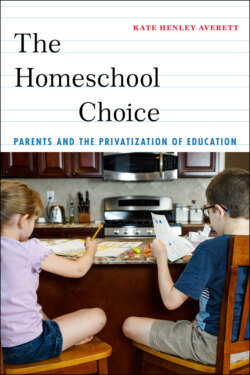Читать книгу The Homeschool Choice - Kate Henley Averett - Страница 34
На сайте Литреса книга снята с продажи.
Children as Autonomous
ОглавлениеWithin this view of childhood, rather than seeing children as innocent, parents see their children as autonomous beings who are capable of exercising agency over their own lives. The practice of allowing children autonomy was a major theme in the sessions that I attended at the Texas Unschoolers conference. This theme was especially evident in a session in which the topic was talking to children about sex and sexuality. The main purpose of the session was to discuss ways of promoting bodily autonomy. Like the session on the “Bailey Bee Believes” program that I attended at one of the Christian conferences, the advice given at this session included teaching children proper names for their anatomy and using these terms without shame, and making it clear to children that they alone have the ability to grant—or deny—someone permission to touch their bodies. While the “Bailey Bee Believes” session leader had advised beginning these practices at age two, the leader of this unschooling session advised beginning them from birth. While it is unrealistic to begin asking for a child’s consent to be hugged or picked up from birth, the session leader noted that it was possible to begin laying the groundwork for these practices from infancy, for example, by telling a baby “now I am going to pick you up,” as a precursor to someday asking to pick them up. She also advised speaking aloud the anatomical terms for body parts when children are infants, not so much for the child’s benefit as for the adult’s. She explained that most of us have some degree of discomfort using these terms that stems from inexperience using them, so telling your infant child “now I am going to wipe your labia” or “now I am going to put diaper cream on your anus” gives parents the chance to get comfortable using the words early on.
In contrast to the session at the Christian conference, in which the information was framed as important to preventing child sexual abuse, this danger discourse of sexuality in childhood was largely absent from the unschooling session, where the purpose of engaging in these practices was framed as giving children a sense of ownership over their own bodies. This session also included an acknowledgment that children are capable of understanding, and experiencing, sexual pleasure.16 One of the takeaway messages of this session was that children are entitled to information about their own bodies, including about sex and sexual pleasure, and that to “shelter” children by denying this information is harmful, not because it places them at risk of abuse but because it denies them full bodily autonomy.
Like Jamie, who was featured at the start of this chapter, several of the unschooling parents I interviewed talked about how they went out of their way not only to teach their children about theoretical concepts like consent and bodily autonomy but also to allow their children, in practice, a great deal of bodily autonomy. Carolyn, a white, middle-income, bisexual, heterosexually married mother of three young sons, spoke at length about the responsibility she felt she had raising sons in what she identified as a rape culture. One of the ways she sought to counteract the culture of men’s sense of entitlement to women’s bodies was through emphasizing bodily autonomy. She makes it clear to her children not only that they never need to, for example, hug someone if they do not want to but also that they need to respect other people’s boundaries as well, including through reading their body language to tell if they do not want to be touched. She described how, when her boys interact with their cousin, Anna, who is an only child and is younger than they are, “sometimes she gets overwhelmed. And I’ll be like, I can see from Anna’s body that she’s had enough. And so we talk a lot about, you need to read people’s bodies as well as listen to their words. The words are absolute. If somebody says no, stop, don’t, whatever, then that is it. But you also need to look at their bodies,” she said, because sometimes a person can be saying “no” through nonverbal communication. Importantly, this was a lesson that Carolyn, like other unschooling parents, did not think children learn in school—that in fact, in training their bodies to conform to the demands and expectations of teachers and other adults, they learn its opposite.
